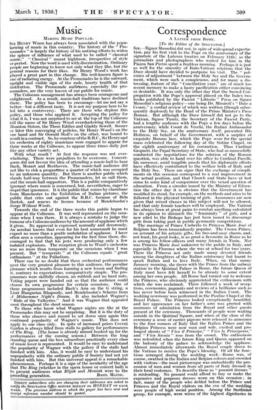Music
MAKING Music POPULAR.
SIR HENRY Wool) has always been associated with the A3opu- larizirig of music in this country. The history of the Pro- menades " is largely the history of his untiring efforts to widen the sphere of influence of what used to be called " classical music." " Classical " meant highbrow, irrespective of style or period. Now the word is used with discrimination. Ordinary people arc beginning to know not only what they like, but the general reasons for their likes. Sir Henry Wood's work has played a great part in this change. His well-known figure is one of radiating energy. At the Promenades he is the outward, upright and visible sign of the rude, hearty health of that institution. The Promenade audiences, especially the pro- menaders, are the very leaven of our public for music. The Coliseum management has always been courageous and enlightened. As a result, music-hall traditions have declined there. The policy has been to encourage—let me hot say a better—but a different taste. It is not my purpose here to be led into a controversy. There are those who deplore this policy, and those who applaud it. Accepting the policy for what it is, I was not surprised to see at the top of the Coliseum bill the name of Sir Henry Wood overshadowing those of the Houston Sisters, the Three Eddies and Gladdy Sewell. Sooner or later this converging of policies, Sir Henry Wood's on the one hand and Sir Oswald Stoll's on the other, was bound to result in a contract. So, by courtesy of the B.B.C., Sir Henry and his orchestra of eighty musicians were engaged to appear for three weeks at the Coliseum, to appear three times daily just like any other variety act.
With what result ? At first the response was not over- whelining._ There were prejudices to be overcome. Concert- goers did not favour the idea of attending a music-hall to hear Bach, Mozart and Beethoven. The music-hall audience did not like to risk a programme a evader of which was occupied by an unknown quantity. But there is another public which stands half-way between the Promenaders,' let us call them, and the music-hall supporters. This is a public comparatively ignorant where music is concerned, but, nevertheless, eager to dispel that ignorance. It is the public that comes by charabanc from Manchester to the Exhibition of Italian pictures, the public that cries out against the B.B.C. because of Bela Bartok, and renews its licence because of Mendelssohn's Songs Without Words.
Towards the end of the three weeks this public began to appear at the Coliseum. It was well represented on the occa- sions when I was there. It is always a mistake to judge the humour of a Coliseum audience by the amount of applause which it gives. Its approval is expressed normally and decorously. An acrobat knows that even for his best somersault he must expect no more than a gentle undulation of applause. I have often seen a comedian, appearing for the first time there, dis- couraged to find that his jests were producing only a few isolated explosions. The reception given to Wood's orchestra was no more than temperate on the occasions when I was present. But " temperate " at the Coliseum equals " great enthusiasm " at the Palladium.
There can be no doubt that these orchestral performances gave the very greatest pleasure to this audience, the peculiar pleasure which results from learning a new lesson and finding it, contrary to expectations, comparatively simple. The pro- grammes were skilfully chosen, no rubbish and no hard nuts. Voting papers were handed out so that the audience could choose its own programme for certain occasions. One of these programmes included Bach's Aria on the G string, a Liszt Hungarian Rhapsody, and Mendelssohn's Scherzo from A Midsummer Night's Dream. It also included Wagner's Ride of the Valkyries." And it was Wagner that appealed most throughout the short season. To those who know what Wagner nights are like at the Promenades this may not be surprising. But it is the duty of those who observe and record to set down once again this continued popularity of Wagner's music. This does not apply to one class only. In spite of increased prices Covent Garden is always filled from stalls to gallery for performances of The Ring. (The house is already almost booked up for the performances of the coming season.) Between the long standing queue and the box subscribers practically every class of music lover is represented. It would be easy to understand the popularity of Wagner with the gallery if the stalls had finished with him. Also, it would be easy to understand his unpopularity with the ordinary public if Society had not yet finished with him. But this universal appeal is a remarkable phenomenon. Perhaps it is a sign of the secularity of the age that The Ring (whether in the opera house or concert hall) is to present audiences what Elijah and Messiah were to the
























































 Previous page
Previous page